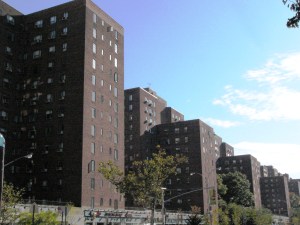 When Tishman Speyer and BlackRock assembled $6.29 billion from a long roster of investors and lenders to bid on Stuveysant Town in late 2006, their prize was the biggest sale ever by price of an individual property. (The complex was sold for $5.4 billion, and another $900 million was rounded up for reserves and capital investments, according to lending documents.)
When Tishman Speyer and BlackRock assembled $6.29 billion from a long roster of investors and lenders to bid on Stuveysant Town in late 2006, their prize was the biggest sale ever by price of an individual property. (The complex was sold for $5.4 billion, and another $900 million was rounded up for reserves and capital investments, according to lending documents.)
Now, it will, presumably, be the biggest default.
Tishman Speyer and BlackRock announced this afternoon they will miss their January debt payment due today, as their reserves to pay off the debt on their highly leveraged deal have run dry.
“[T]he joint venture will not make today’s scheduled full debt service payment to its senior lenders,” a joint statement from the two firms said. “The joint venture has been engaged in discussions with CWCapital, the special servicer acting on behalf of the lenders, and hopes to continue good-faith negotiations toward a potential restructuring of the debt.”
Now an official notice of default is expected, and the special servicer, CWCapital, will sort through the numerous holders of the debt on the property–investors who bought bonds in one of a set of Commercial Mortgage Backed Securities.
Among those are Fannie Mae and Freddie Mac, who both claim they do not have a seat at the table because they hold the most secure bonds on the property. In all, there is $3 billion in debt financed through the sale of bonds; based on current rent rolls (which are in flux), the property is valued by various analysts at about $1.9 billion.
The missed payment is the beginning of an end for what’s been a rowdy three-year ride for the owners, who bet big at the market’s peak that New York City was on the rapid rise–that rents would continue their constant ascent seen at the time. They also gambled they could remove rent-regulated tenants at a faster rate than they already had been doing, converting the apartments to market rates that could pay twice as much rent. The results: rents flattened and then fell; the rate of conversions slowed.
And then came the icing on the cake: a court decision that ruled Tishman Speyer (and the previous owner, MetLife, along with other landlords throughout the city) had been illegally deregulating apartments due to the receipt of a tax break that encourages renovations.
The move was expected for months, and yesterday, per The Times, the Speyers started spreading the word on the impending default.
What happens next is unclear, and will depend what road the special servicer and bondholders decide to go down. The property could be sold, though there is uncertainty over the price given outstanding litigation following the rent regulation court decision.
Tishman Speyer has shown no willingness to give up the property immediately–they take in millions in fees so long as they’re the complex’s manager–and the firm has made clear that other holdings are insulated from this default.
The Times reported news of the impending default Friday.
ebrown@observer.com



